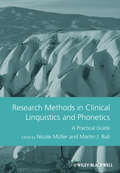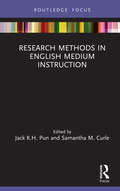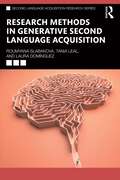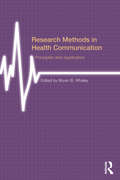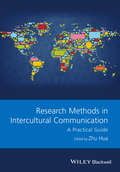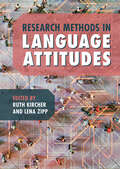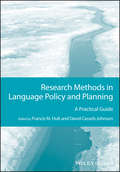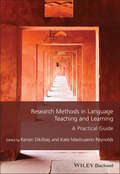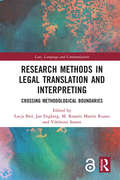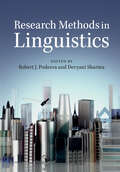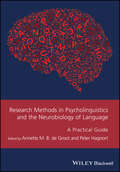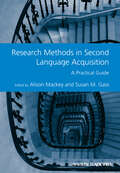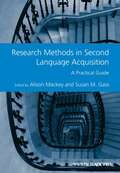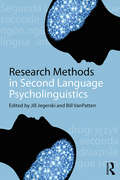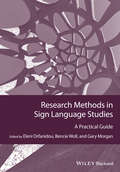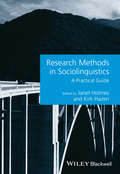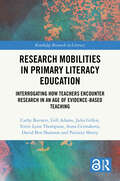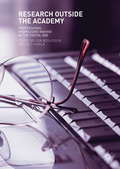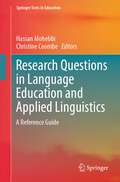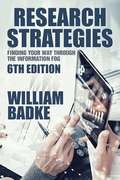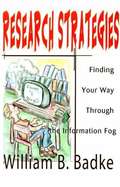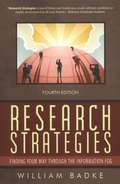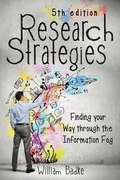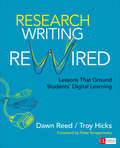- Table View
- List View
Research Methods in Clinical Linguistics and Phonetics
by Martin J. Ball Nicole MüllerThe only volume to offer hands-on information about the wide range of research philosophies, methods and tools used across linguistics, phonetics, and speech science, as applied to disordered speech and language.* Covers core topics for students undertaking their own research, including experimental and qualitative methods, sociolinguistics, corpus construction and analysis, data recording, transcription and digital analysis of speech, and speech imaging.* Considers the research ethics associated with working with people who have speech, language or other communication difficulties.* Includes a detailed discussion of the dissemination of research results, and advice on the writing of theses and dissertations, and on the writing and publishing of journal articles, as well the peer review process.* Offers students and researchers from a variety of entry points - such as linguistics, education, psychology, and speech pathology - an introduction to the scope of research in clinical linguistics and phonetics, and a practical guide to this interdisciplinary field
Research Methods in English Medium Instruction (Routledge Research in Higher Education)
by Jack K.H. Pun; Samantha M. CurleIn this special edited volume, the editors and invited English Medium Instruction (EMI) researchers, from different parts of the world, outline the latest EMI research methods. Providing academic instruction using English is rapidly spreading in many countries where English is a second or foreign language, and there is a growing interest in researching the effectiveness and effects of EMI across different educational levels. This volume includes chapters on everything from research into classroom interaction to teachers’ and students’ perceptions and motivations to language challenges and strategies and the pedagogical implications of translanguaging in EMI classrooms. These specific topics were chosen to reflect different approaches to researching EMI. Each chapter focuses on a specific type of research methodology. It begins with an overview of the literature of the topic under discussion. Then an example study is provided to illustrate how this methodology can be used to investigate EMI. Each chapter identifies the process that the EMI researcher used to conduct their research and discusses key dilemmas they faced, focusing particularly on the methodological issues they encountered. By exploring these issues, this volume hopes to inform theory (or the lack thereof) underlying research into the phenomenon of EMI. This volume is indispensable for EMI tutors, curriculum developers, policymakers, and teachers, as well as students at both undergraduate and postgraduate levels. It is particularly valuable for researchers from across the globe working in the fields of applied linguistics, language education, English for Academic Purposes (EAP), English Language Teaching (ELT), and Teaching English to Speakers of Other Languages (TESOL).
Research Methods in Generative Second Language Acquisition (ISSN)
by Roumyana Slabakova Tania Leal Laura DomínguezThis timely text provides a comprehensive overview of the research methods used by the Generative Second Language Acquisition framework.The authors lay out the history and state of the art in the field, explain the theoretical underpinnings of this work, and offer practical hands-on guidance for developing, conducting and understanding studies related to L2 grammatical competence—using a rich array of techniques and advancing key insights into the rationale and circumstantial pros and cons of each method.With useful features in a consistent chapter structure, including diverse case studies and discussion questions, the book will be an invaluable resource to students and researchers of SLA, applied linguistics, theoretical linguistics, education, and related areas.
Research Methods in Health Communication: Principles and Application
by Bryan B. WhaleyThis volume provides an essential roster of primary research methods as they apply to health communication inquiry. Editor Bryan B. Whaley brings together key health communication researchers to write about their primary methodological areas. Their chapters offer guidance and insights for a variety of approaches to answering research questions. The methods included here cover: Exploration and Description: interview/focus groups, case study, ethnography, and surveys; Examining Messages and Interpersonal Exchanges: narrative analysis, conversational analysis, analyzing physician-patient interactions, social network analysis, and content analysis; Causal Explication: experimental research, meta-analysis, and meta-synthesis; and Cultural, Population, and Critical Concerns: rhetorical methods and criticism, and methodological issues when investigating stigmatized populations, and groups with health disparities. Chapters cite or use examples from allied health areas -- nursing, public health, sociology, medicine -- to demonstrate the breadth of health communication studies. This work highlights the importance of methodology in health communication research in multiple contexts. Developed to provide a fundamental reference for investigating health communication, this volume will serve as an invaluable tool for researchers and students across the social science and health disciplines.
Research Methods in Intercultural Communication: A Practical Guide (Guides to Research Methods in Language and Linguistics)
by Zhu HuaResearch Methods in Intercultural Communication introduces and contextualizes the most important methodological issues in the field for upper-level undergraduate and graduate students. Examples of these issues are which paradigms and how to research multilingually, interculturally and ethnically. Provides the first dedicated and most comprehensive volume on research methods in intercultural communication research in the last 30 years Explains new and emerging methods, as well as more established ones. These include: Matched Guise Technique, Discourse Completion Task, Critical Incident Technique, Critical Discourse Analysis, Ethnography, Virtual Ethnography, Corpus Analysis, Multimodality, Conversation Analysis, Narrative Analysis, Questionnaire and Interview. Assists readers in determining the most suitable method for various research questions, conceptualizing the research process, interpreting results, and drawing conclusions Supports students from start to finish with key terms, suggestions for further reading, research summaries, and sound guidance from experienced scholars and researchers
Research Methods in Language Attitudes
by Ruth Kircher Lena ZippAttitudes towards spoken and written language are of significant interest to researchers in sociolinguistics, applied linguistics, communication studies, and social psychology. This is the first interdisciplinary guide to traditional and cutting-edge methods for the investigation of language attitudes. Written by experts in the field, it provides an introduction to attitude theory, helps readers choose an appropriate method, and guides through research planning and design, data collection, and analysis. Chapters include step-by-step instructions to illustrate and facilitate the use of the different methods as well as case studies from a wide range of linguistic contexts. The book also goes beyond individual methods by offering guidance on how to research attitudes in multilingual and signing communities, based on historical data, with the help of priming, and by means of mixed-methods approaches.
Research Methods in Language Policy and Planning: A Practical Guide (Guides to Research Methods in Language and Linguistics #6)
by Francis M. Hult David Cassels JohnsonThis is the first volume exclusively devoted to research methods in language policy and planning (LPP). Each chapter is written by a leading language policy expert and provides a how-to guide to planning studies as well as gathering and analyzing data Covers a broad range of methods, making it easily accessible to and useful for transdisciplinary researchers working with language policy in any capacity Will serve as both a foundational methods text for graduate students and novice researchers, and a useful methodological reference for experienced LPP researchers Includes a series of guidelines for public engagement to assist scholars as they endeavor to incorporate their work into the public policy process
Research Methods in Language Teaching and Learning: A Practical Guide (Guides to Research Methods in Language and Linguistics)
by Li WeiA practical guide to the methodologies used in language teaching and learning research, providing expert advice and real-life examples from leading TESOL researches Research Methods in Language Teaching and Learning provides practical guidance on the primary research methods used in second language teaching, learning, and education. Designed to support researchers and students in language education and learning, this highly accessible book covers a wide range of research methodologies in the context of actual practice to help readers fully understand the process of conducting research. Organized into three parts, the book covers qualitative studies, quantitative studies, and systematic reviews. Contributions by an international team of distinguished researchers and practitioners explain and demonstrate narrative inquiry, discourse analysis, ethnography, heuristic inquiry, mixed methods, experimental and quasi-experimental studies, and more. Each chapter presents an overview of a method of research, an in-depth description of the research framework or data analysis process, and a meta-analysis of choices made and challenges encountered. Offering invaluable insights and hands-on research knowledge to students and early-career practitioners alike, this book: Focuses on the research methods, techniques, tools, and practical aspects of performing research Provides firsthand narratives and case studies to explain the decisions researchers make Compares the relative strengths and weaknesses of different research methods Includes real-world examples for each research method and framework to highlight the context of the study Includes extensive references, further reading suggestions, and end-of-chapter review questions Part of the Guides to Research Methods in Language and Linguistics series, Research Methods in Language Teaching and Learning is essential reading for students, educators, and researchers in all related fields, including TESOL, second language acquisition, English language teaching, and applied linguistics.
Research Methods in Language Variation and Change
by Manfred Krug Julia SchlüterMethodological know-how has become one of the key qualifications in contemporary linguistics, which has a strong empirical focus. Containing 23 chapters, each devoted to a different research method, this volume brings together the expertise and insight of a range of established practitioners. The chapters are arranged in three parts, devoted to three different stages of empirical research: data collection, analysis and evaluation. In addition to detailed step-by-step introductions and illustrative case studies focusing on variation and change in English, each chapter addresses the strengths and weaknesses of the methodology and concludes with suggestions for further reading. This systematic, state-of-the-art survey is ideal for both novice researchers and professionals interested in extending their methodological repertoires. The book also has a companion website which provides readers with further information, links, resources, demonstrations, exercises and case studies related to each chapter.
Research Methods in Legal Translation and Interpreting: Crossing Methodological Boundaries (Law, Language and Communication)
by Łucja Biel Vilelmini Sosoni Jan Engberg Rosario Martín RuanoThe field of legal translation and interpreting has strongly expanded over recent years. As it has developed into an independent branch of Translation Studies, this book advocates for a substantiated discussion of methods and methodology, as well as knowledge about the variety of approaches actually applied in the field. It is argued that, complex and multifaceted as it is, legal translation calls for research that might cross boundaries across research approaches and disciplines in order to shed light on the many facets of this social practice. The volume addresses the challenge of methodological consolidation, triangulation and refinement. The work presents examples of the variety of theoretical approaches which have been developed in the discipline and of the methodological sophistication which is currently being called for. In this regard, by combining different perspectives, they expand our understanding of the roles played by legal translators and interpreters, who emerge as linguistic and intercultural mediators dealing with a rich variety of legal texts; as knowledge communicators and as builders of specialised knowledge; as social agents performing a socially situated activity; as decision-makers and agents subject to and redefining power relations, and as political actors shaping legal cultures and negotiating cultural identities, as well as their own professional identity.
Research Methods in Linguistics
by Robert J. Podesva Devyani SharmaA comprehensive guide to conducting research projects in linguistics, this book provides a complete training in state-of-the-art data collection, processing, and analysis techniques. The book follows the structure of a research project, guiding the reader through the steps involved in collecting and processing data, and providing a solid foundation for linguistic analysis. All major research methods are covered, each by a leading expert. Rather than focusing on narrow specializations, the text fosters interdisciplinarity, with many chapters focusing on shared methods such as sampling, experimental design, transcription and constructing an argument. Highly practical, the book offers helpful tips on how and where to get started, depending on the nature of the research question. The only book that covers the full range of methods used across the field, this student-friendly text is also a helpful reference source for the more experienced researcher and current practitioner.
Research Methods in Psycholinguistics and the Neurobiology of Language: A Practical Guide (Guides to Research Methods in Language and Linguistics)
by Annette M. B. de Groot Peter HagoortThe first comprehensive guide to research methods and technologies in psycholinguistics and the neurobiology of language Bringing together contributions from a distinguished group of researchers and practitioners, editors Annette M. B. de Groot and Peter Hagoort explore the methods and technologies used by researchers of language acquisition, language processing, and communication, including: traditional observational and behavioral methods; computational modelling; corpus linguistics; and virtual reality. The book also examines neurobiological methods, including functional and structural neuroimaging and molecular genetics. Ideal for students engaged in the field, Research Methods in Psycholinguistics and the Neurobiology of Language examines the relative strengths and weaknesses of various methods in relation to competing approaches. It describes the apparatus involved, the nature of the stimuli and data used, and the data collection and analysis techniques for each method. Featuring numerous example studies, along with many full-color illustrations, this indispensable text will help readers gain a clear picture of the practices and tools described. Brings together contributions from distinguished researchers across an array of related disciplines who explain the underlying assumptions and rationales of their research methods Describes the apparatus involved, the nature of the stimuli and data used, and the data collection and analysis techniques for each method Explores the relative strengths and weaknesses of various methods in relation to competing approaches Features numerous real-world examples, along with many full-color illustrations, to help readers gain a clear picture of the practices and tools described
Research Methods in Second Language Acquisition
by Alison Mackey Susan M. GassResearch Methods in Second Language Acquisition: A Practical Guideis an informative guide to research design and methodology for graduate students and scholars. Each chapter of this volume offers background, step-by-step guidance, and relevant studies to create comprehensive coverage of each method. Includes chapters by expert scholars on an array of topics, including second language writing and reading, meta-analyses, research replication, qualitative data collection and analysis, and moreIncludes feature boxes in each chapter highlighting relevant research studies, discussion questions and suggested further readingsUtilizes research methods and tools from varied fields of study including education, linguistics, psychology, and sociology
Research Methods in Second Language Acquisition: A Practical Guide
by Alison Mackey Susan M. GassResearch Methods in Second Language Acquisition: A Practical Guideis an informative guide to research design and methodology for graduate students and scholars. Each chapter of this volume offers background, step-by-step guidance, and relevant studies to create comprehensive coverage of each method. Includes chapters by expert scholars on an array of topics, including second language writing and reading, meta-analyses, research replication, qualitative data collection and analysis, and more Includes feature boxes in each chapter highlighting relevant research studies, discussion questions and suggested further readings Utilizes research methods and tools from varied fields of study including education, linguistics, psychology, and sociology
Research Methods in Second Language Psycholinguistics (Second Language Acquisition Research Series)
by Bill VanPatten Jill JegerskiAddressing a rapidly growing interest in second language research, this hands-on text provides students and researchers with the means to understand and use current methods in psycholinguistics. With a focus on the actual methods, designs, and techniques used in psycholinguistics research as they are applied to second language learners, this book offers the practical guidance readers need to determine which method is the best for what they wish to investigate as well as the tools that will enhance their research. Each methods chapter is written by a leading expert who describes, discusses, and comments on how a method is used and what its strengths and limitations are for second language research. These chapters follow a specific format to ensure cohesion and a predictable structure across all chapters. The chapters also inform the novice researcher on such key issues as ease of use, costs, potential pitfalls, and other related matters, each of which impact decisions that researchers make about the paths they take. With the most reliable information available from experienced reseachers, Research Methods in Second Language Psycholinguistics is an essential resource for anyone interested in conducting second language reserach using psycholinguistic methods.
Research Methods in Sign Language Studies: A Practical Guide (Guides to Research Methods in Language and Linguistics)
by Gary Morgan Bencie Woll Eleni OrfanidouResearch Methods in Sign Language Studies is a landmark work on sign language research, which spans the fields of linguistics, experimental and developmental psychology, brain research, and language assessment. Examines a broad range of topics, including ethical and political issues, key methodologies, and the collection of linguistic, cognitive, neuroscientific, and neuropsychological data Provides tips and recommendations to improve research quality at all levels and encourages readers to approach the field from the perspective of diversity rather than disability Incorporates research on sign languages from Europe, Asia, North and South America, and Africa Brings together top researchers on the subject from around the world, including many who are themselves deaf
Research Methods in Sociolinguistics: A Practical Guide (Guides to Research Methods in Language and Linguistics)
by Janet Holmes Kirk HazenThis single-volume guide equips students of sociolinguistics with a full set of methodological tools including data collection and analysis techniques, explained in clear and accessible terms by leading experts. It features project suggestions, troubleshooting tips, and data assessment across diverse languages. Explores an array of anthropological and scientific methods that cover the full spectrum of contemporary sociolinguistics, from the study of style and discourse analysis to the study of phonetics Details the types of data available, and explains collection methods ranging from sociolinguistic interviews to linguistic landscapes Provides comprehensive coverage of data analysis, subdivided into segments on linguistic and socio-cultural techniques, and linked to numerous languages Includes useful summaries, seasoned advice and troubleshooting tips, ideas for research projects, and a full directory of supplementary reading
Research Mobilities in Primary Literacy Education: Interrogating How Teachers Encounter Research in an Age of Evidence-based Teaching (Routledge Research in Literacy)
by Julia Gillen Cathy Burnett Gill Adams Terrie Lynn Thompson David Ben Shannon Parinita Shetty Anna CermakovaThis book delves into the intriguing question of why certain types of literacy research gain more traction than others in educational settings.It draws upon findings from Research Mobilities in Primary Literacy Education, an innovative and interdisciplinary study conducted in England and supported by the Economic and Social Research Council [ES/W000571/1]. The study investigated the types of literacy research that reach teachers, the ways in which human and non-human actors mobilise research and the transformation of research as it circulates. The book argues that, for teachers to foster genuinely inclusive literacy classrooms, they need to be equipped to draw on understandings associated with a variety of theoretical perspectives and research traditions. It further explores the dynamics of research dissemination and the factors that influence the uptake and application of research findings in educational contexts. This work is an original and groundbreaking contribution to debates about the scope and focus of literacy education, the role of evidence-based teaching and approaches to professional learning.This book is of vital interest to scholars, researchers and students with interests in Literacy Education, Professional Development and the Ethics of Research. It challenges conventional wisdom, provokes thoughtful discussion and inspires readers to rethink the role and value of research in shaping literacy education that is inclusive, effective and meaningful.
Research Outside The Academy: Professional Knowledge-making In The Digital Age
by Lisa Börjesson Isto HuvilaThis book analyses the practical, information-related dimensions of professional knowledge making and communication in extra-academic organisations. It treats the sites where research takes place and where knowledge is created outside academia in the light, among other things, of new digital resources. It provides valuable insight into the practices through which extra-academic research data and results are produced and made available and the settings in which this takes place. With case studies of knowledge-making in government organizations and state research institutes, as well as in cultural and heritage institutions, this book broadens the perspective on knowledge sharing, communication and publication, and how knowing changes as a result of the professional knowledge-making practices in the digital age.Research outside the Academy is ideal for students at all levels looking for an introduction to the topic of research and knowledge-making in society. Moreover, researchers and professionals in the fields of library and information science and science and technology studies will find the book to be adding to previous understandings of scholarly documentation and communication.
Research Questions in Language Education and Applied Linguistics: A Reference Guide (Springer Texts in Education)
by Christine Coombe Hassan MohebbiThis volume encompasses the range of research questions on language-related problems that arise in language teaching, learning and assessment. The [150] chapters are written by experts in the field who each offer their insights into current and future directions of research, and who suggest several highly relevant research questions. Topics include, but are not limited to: language skills teaching, language skills assessment and testing, measurement, feedback, discourse analysis, pragmatics, semantics, language learning through technology, CALL, MALL, ESP, EAP, ERPP, TBLT, materials development, genre analysis, needs analysis, corpus, content-based language teaching, language teaching and learning strategies, individual differences, research methods, classroom research, form-focused instruction, age effects, literacy, proficiency, and teacher education and teacher development. The book serves as a reference and offers inspiration to researchers and students in language education. An important skill in reviewing the research literature is following a study’s “plan of attack.” Broadly, this means that before accepting and acting upon the findings, one considers a) the research question (Is it clear and focused? Measurable?), b) the subjects examined, the methods deployed, and the measures chosen (Do they fit the study’s goal and have the potential to yield useful results?), and c) the analysis of the data (Do the data lead to the discussion presented? Has the author reasonably interpreted results to reach the conclusion?). Mohebbi and Coombe’s book, Research Questions in Language Education and Applied Linguistics: A Reference Guide, helps budding researchers take the first step and develop a solid research question. As the field of language education evolves, we need continual research to improve our instructional and assessment practices and our understanding of the learners’ language learning processes. This book with its remarkable 150 topics and 10 times the number of potential research questions provides a wealth of ideas that will help early career researchers conduct studies that move our field forward and grow our knowledge base. Deborah J. Short, Ph.D., Director, Academic Language Research & Training, Past President, TESOL International Association (2021-22)As a teacher in graduate programs in TESOL I frequently come across the frustration of students at centering their research interests on a particular topic and developing research questions which are worth pursuing so as to make a contribution to the field. This frustration stems from the fact that our field is so vast and interrelated, that it is often impossible to properly address all that interests them. Hence, I wholeheartedly welcome this most relevant and innovative addition to the research literature in the field of TESOL and Applied Linguistics. Coombe and Mohebbi have created a real tour de force that stands to inform budding researchers in the field for many years to come. Additionally, the cutting-edge depiction of the field and all it has to offer will no doubt update the research agendas of many seasoned researchers around the world. The 150 chapters are organized in a most powerful, yet, deceptively simple way offering a positioning within the topic, suggesting questions that might direct inquiry and offering a basic set of bibliographic tools to start the reader in the path towards research. What is more, the nine sections in which the chapters are organized leave no area of the field unexplored. Dr. Gabriel Díaz Maggioli, Academic Advisor, Institute of Education, Universidad ORT del Uruguay, President, IATEFL
Research Strategies: Finding Your Way Through The Information Fog (Sixth Edition)
by William BadkeWe live in a time when there is more knowledge available to us than ever before. Yet we struggle to make sense of it. When a research deadline looms and all you see is a confusing fog of data, you know you need help. In this sixth edition of Research Strategies, author William Badke helps you make sense of it all. He will show you how to navigate the information fog intelligently, and he will detail how to use it to your advantage to become a better researcher. Badke focuses on informational research and provides a host of tips and advices not only for conducting research, but also for everything from finding a topic to writing an outline to locating high quality, relevant resources to finishing the final draft. Study guides, practice exercises, and assignments at the end of each chapter will help reinforce the lessons. As an experienced researcher who has led thousands of students to ramp up their research abilities, Badke uses humor to help you gain a better understanding of today's world of complex technological information. Research Strategies provides the skills and strategies to efficiently and effectively complete a research project from topic to final product.
Research Strategies: Finding Your Way Through the Information Fog
by William B. BadkeFilled with time-tested strategies and expert advice, Research Strategies teaches you the skills that are essential to the success of any research project.
Research Strategies: Finding Your Way Through the Information Fog 4th Edition
by William BadkeBecause of the dynamic nature of the Internet, any web addresses or links contained in this book may have changed since publication and may no longer be valid. The views expressed in this work are solely those of the author and do not necessarily reflect the views of the publisher, and the publisher hereby disclaims any responsibility for them.
Research Strategies: Finding Your Way through the Information Fog
by William BadkeOnline resources have given us access to more knowledge than ever before. We're buried in data, and defining what is and what is not genuine information becomes more of a challenge all the time. In this fifth edition of Research Strategies, author William Badke helps you make sense of all of the available information, shows you how to navigate and discern it, and details how to use it to your advantage to become a better researcher. Badke focuses on informational research and provides a host of tips and advice not only for conducting research, but also for everything from finding a topic to writing an outline to documenting resources and polishing the final draft. Study guides, practice exercises, and assignments at the end of each chapter help reinforce each lesson. An experienced research instructor who has led thousands of students to become better researchers, Badke uses humor to help you gain a better understanding of today's complex, technological world. Research Strategies provides the skills and strategies to efficiently and effectively complete a research project from topic to finished product. It shows how research can be exciting and even fun.
Research Writing Rewired: Lessons That Ground Students’ Digital Learning (Corwin Literacy)
by Dawn M. Reed Troy W. HicksOur students are online constantly, and yet research shows that only half of teachers say digital tools make writing instruction easier. Research Writing Rewired seeks to turn that statistic upside down. Or, rather, upside right: If we want to ready students for a globalized world, 100% of teachers ought to consider technology an asset to any kind of writing, assert authors Dawn Reed and Troy Hicks. But the "main wiring" still has to be the ELA standards and the essential questions at the heart of each content area. To that end, the authors show you how to use digital tools within a multi-week inquiry unit to increase students’ engagement as they write-to-learn and share knowledge. Their book a clear model for tech-rich research writing that will inform your own inquiry-driven units. Guiding components include: An inquiry-based, technology-rich unit on identity and culture that provides learners with opportunities to engage with the very same issues that are written about and discussed by citizens of a global society 28 model lessons and a framework including extensions, tech tips, and activities that blend print, image, apps, and video so students build multi-literacy skills day by day Recurring use of best practices like formative assessment, close reading, think alouds and teaching key skills, including analyzing and synthesizing, annotating, checking credibility of sources, discussion, and writing about reading Dozens of lessons and activities built around students’ favorite technology tools and online destinations, including: Citelighter, Smore, ThingLink, Padlet, and Cazles, Animoto, Mural.ly, and getLoupe, Genius and Lit Genius, Now Comment, You Voices QR codes that take you to video clips on a companion website, so you can see the teaching techniques and digital tools in action It’s up to us to make the digital learning in school a lot more like the digital learning we all do in life. Research Writing Rewired shows us how to channel students’ passion for digital communication into meeting ELA goals.
